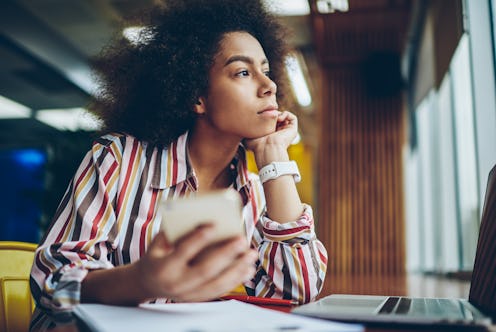(Living)
Experts Say This Is The Best Way To Deal With Post-Isolation Anxiety

Most of the world has been on pause for weeks now, with people forced to learn an entirely new normal. As more COVID-19 advancements and knowledge begin to forge a path out of quarantine, many big questions still remain. Though there will be reason to celebrate, it's worth considering what could be the effects of social distancing — both long and short term. As the world begins to open back up, where will it leave your emotional state? Will you be able to return to business as usual, or will fear and anxiety remain an obstacle even after you're able to go back to work, engage with others, and otherwise resume your pre-isolation routine?
Not only do mental health experts think it's understandable that many are already asking themselves these questions, but they believe it could be a healthy step in preparing you for what may lie ahead. In fact, you're probably already experiencing a few of the short-term effects of social distancing. Dr. Stephanie Insko, a counseling psychologist at Brentwood Counseling Associates notes that even those who have been maintaining social relationships over the phone or with virtual hangs could be experiencing a lack of connection. "[There] are things that we miss out on when we can’t be with each other in person," she says. "Nonverbal communication, for example, gives us much more information than just what comes out of people’s mouths. But it’s also much harder to read over the phone or FaceTime. So we may be missing out on how the ones we care about are actually doing."
Overarching Effects Of Social Distancing
Dr. Insko also says that lack of physical touch can have a profound effect on some self-isolated people. "The power of human touch is something that some of us might be in short supply of right now," she explains. "Calming, stress-reducing hormones such as oxytocin are released when we hug another person. And that process just can’t be replicated virtually."
If this doesn't sound like a big deal, it's worth mentioning that oxytocin levels have been proven to have an effect on anxiety and depression — which could be a more long-term effect of social distancing, especially if you're doing so without a partner, roommate, or family member sharing your space or have struggled with these issues in the past. "For those who live alone, and particularly for those who grapple with mental health concerns already, the inability to hug a friend or loved one for such a long time could make things worse," Dr. Insko says, adding that this can also effect your existing relationships. "Similarly, when we can’t adequately read another person’s nonverbal communication, we might miss out on their hidden struggles. Over time, they might begin to feel less validated and more alone, which can’t be good for their emotional wellbeing."
And that doesn't even touch on those who have lost someone close to them or have suffered financial hardship as a result of the global pandemic. "Lots of folks will still be grieving the death of loved ones, and others will be struggling to figure out a new way of life after they’ve lost considerable amounts of income, or work altogether," Dr. Insko explains. "I wouldn’t be surprised to see a significant increase in depression and anxiety as a result. I also anticipate a lot of fear and distrust that it’s safe to return to normal. I wonder if, for example, many parents might keep their kids home even after schools reopen."
How To Combat Effects Of Social Distancing
It's a lot to process, but Dr. Insko does offer some ways you may be able to reduce the likelihood of post-isolation anxiety, fear, and depression. For one, she encourages leaning on your existing support system as well as giving back to others, whether it be checking in with a neighbor or donating to a local food bank. "I think carrying through this sense that we’re all in it together would be a huge help as we transition back to normal," she says. "It might also be a way to regain some control in a life that feels very out of control. Not knowing when we can return to normal, or even what that normal will look like, has been really disorienting for a lot of people, but knowing that you’re making a difference can be grounding and bring back a sense of agency over your life."
Starting or continuing with therapy could be another beneficial way to cope. But no matter who you're connecting with, Dr. Insko stresses being honest and vulnerable about your feelings. "Be completely real about what you’re going through," she says. "Vulnerability can increase our feelings of connection with each other, which is sorely needed when we’re forced to be apart. When we’re open and honest about what we’re truly thinking and feeling, and let others into our world, we don’t feel so alone anymore."
This article was originally published on